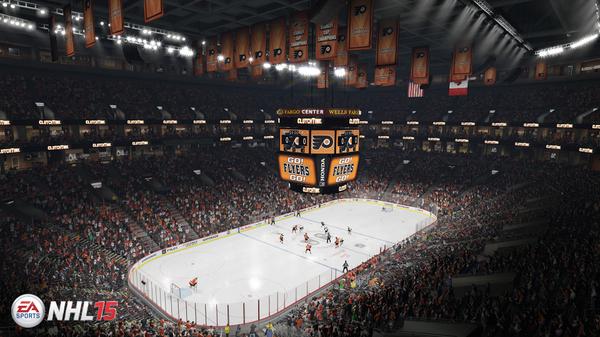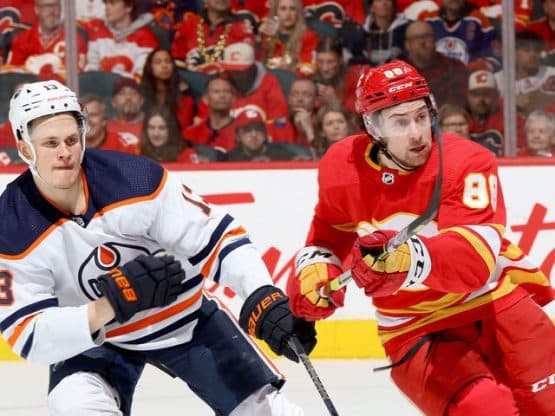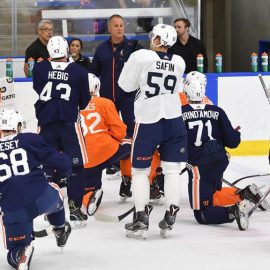Previously I had examined the officiating in the first round series between the Sharks and Kings.
You can find the articles on my method, game 1, games 2 and 3, and games 4 and 5 here.
In this article we’ll be summarizing the series as a whole, looking at the overall officiating, at what rate certain penalties are called relative to others, and whether there was any evidence of a bias or preference in the series.
As usual, I am including my raw data in the event anyone wishes to review the work.The following is the entirety of the fouls, called and uncalled, I recorded during the five-game series. You don’t have to read it, but I want to make sure the data is there in the event anyone wants to try and replicate or check my work. So please, scroll through and I promise it’ll be an easier read at the bottom.
| M/C | Severity | Type | SJS | LAK |
|---|---|---|---|---|
| M | 1p | CC | 8 | |
| M | 1p | Bd | 39 | |
| M | 1p | Bd | 48 | |
| M | 1p | CC | 48 | |
| M | 1p | CC | 65 | |
| M | 1p | CC | 68 | |
| M | 1p | CC | 70 | |
| M | 1p | CC | 73 | |
| M | 1p | Hk | 7 | |
| M | 1p | R | 12 | |
| M | 1p | R | 61 | |
| M | 1p | R | 52 | |
| M | 1p | R | 19 | |
| M | 1p | R | 88 | |
| M | 1p | R | 70 | |
| M | 1p | R | 52 | |
| M | 1p | Sl | 8 | |
| M | 1p | Sl | 27 | |
| M | 1p | Sl | 39 | |
| M | 1p | Sl | 43 | |
| M | 1p | Sl | 60 | |
| M | 1p | Sl | 61 | |
| M | 1p | Sl | 11 | |
| M | 1p | Sl | ? | |
| M | 1p | Sl | 44 | |
| M | 1p | Sl | 13 | |
| M | 1p | U | 31 | |
| C | 1t | Hk | 42 | |
| C | 1t | Hk | 77 | |
| C | 1t | Tr | 32 | |
| M | 1t | GI | ? | |
| M | 1t | Hd | 50 | |
| M | 1t | Hd | 57 | |
| M | 1t | Hd | 22 | |
| M | 1t | Hd St | 27 | |
| M | 1t | Hd St | 73 | |
| M | 1t | Hd St | 3 | |
| M | 1t | Hk | 60 | |
| M | 1t | Hk | 61 | |
| M | 1t | Hk | 83 | |
| M | 1t | Hk | 74 | |
| M | 1t | Hk | 6 | |
| M | 1t | Hk | 8 | |
| M | 1t | Hk | 44 | |
| M | 1t | Hk | 8 | |
| M | 1t | Hk | 12 | |
| M | 1t | Hk | 43 | |
| M | 1t | Hk | 48 | |
| M | 1t | Hk | 58 | |
| M | 1t | Hk | 7 | |
| M | 1t | Hk | 27 | |
| M | 1t | Hk | 11 | |
| M | 1t | Hk | 8 | |
| M | 1t | Hk | 22 | |
| M | 1t | Hk | 77 | |
| M | 1t | Int | 27 | |
| M | 1t | Int | 83 | |
| M | 1t | Int | 70 | |
| M | 1t | Int | 23 | |
| M | 1t | Int | 23 | |
| M | 1t | Int | 52 | |
| M | 1t | Int | 48 | |
| M | 1t | Int | 48 | |
| M | 1t | Int | 73 | |
| M | 1t | Int | 10 | |
| M | 1t | Int | 44 | |
| M | 1t | Tr | 8 | |
| M | 1t | Tr | 8 | |
| M | 1t | Tr | 48 | |
| M | 1t | Tr | 77 | |
| M | 1t | Tr | 70 | |
| M | 1t | Tr | 13 | |
| M | 1t | Tr | 19 | |
| C | 2p | Int | 23 | |
| C | 2p | R | 19 | |
| C | 2p | R | ? | |
| M | 2p | Bd | 22 | |
| M | 2p | Bd | 73 | |
| M | 2p | Bd | 23 | |
| M | 2p | Bd | 39 | |
| M | 2p | Bd | 17 | |
| M | 2p | Bd | 5 | |
| M | 2p | CC | 8 | |
| M | 2p | CC | 8 | |
| M | 2p | CC | 8 | |
| M | 2p | CC | 48 | |
| M | 2p | CC | 8 | |
| M | 2p | CC | 19 | |
| M | 2p | CC | 83 | |
| M | 2p | HS | 17 | |
| M | 2p | HS | 19 | |
| M | 2p | Int | 4 | |
| M | 2p | R | 8 | |
| M | 2p | R | 39 | |
| M | 2p | R | 39 | |
| M | 2p | R | 11 | |
| M | 2p | R | 23 | |
| M | 2p | R | 73 | |
| M | 2p | R | 16 | |
| M | 2p | R | 19 | |
| M | 2p | R | 27 | |
| M | 2p | R | 42 | |
| M | 2p | R | 50 | |
| M | 2p | R | 13 | |
| M | 2p | Sl | 7 | |
| M | 2p | Sl | 44 | |
| M | 2p | Sl | 10 | |
| M | 2p | Sl | 23 | |
| M | 2p | Sl | 52 | |
| M | 2p | Sl | 5 | |
| M | 2p | Sl | 11 | |
| M | 2p | Sl | 12 | |
| M | 2p | Sl | 23 | |
| M | 2p | Sl | 73 | |
| M | 2p | Sl | 3 | |
| M | 2p | Sl | 73 | |
| M | 2p | Sl | 12 | |
| M | 2p | Sl | 13 | |
| M | 2p | Sl | 16 | |
| M | 2p | Sl | 19 | |
| M | 2p | Sl | 39 | |
| M | 2p | Sl | 70 | |
| M | 2p | Sp | 22 | |
| C | 2t | Hk | 48 | |
| C | 2t | Int | 48 | |
| C | 2t | Int | 70 | |
| C | 2t | Tech | $ | |
| C | 2t | Tr | 48 | |
| C | 2t | Tr | 7 | |
| C | 2t | Tr | 22 | |
| C | 2t | ? | ||
| M | 2t | Bd | 22 | |
| M | 2t | GI | 32 | |
| M | 2t | Hd | 12 | |
| M | 2t | Hd | 48 | |
| M | 2t | Hd St | 12 | |
| M | 2t | Hd St | 11 | |
| M | 2t | Hk | 16 | |
| M | 2t | Hk | 16 | |
| M | 2t | Hk | 48 | |
| M | 2t | Hk | 48 | |
| M | 2t | Hk | 61 | |
| M | 2t | Hk | 68 | |
| M | 2t | Hk | ? | |
| M | 2t | Hk | ? | |
| M | 2t | Hk | 10 | |
| M | 2t | Hk | 77 | |
| M | 2t | Hk | 70 | |
| M | 2t | Hk | 22 | |
| M | 2t | Hk | 17 | |
| M | 2t | Hk | 8 | |
| M | 2t | Hk | 42 | |
| M | 2t | Hk | 46 | |
| M | 2t | Hk | 61 | |
| M | 2t | Hk | 83 | |
| M | 2t | Hk | 73 | |
| M | 2t | Hk | 44 | |
| M | 2t | Hk | 17 | |
| M | 2t | Hk | 74 | |
| M | 2t | Int | 8 | |
| M | 2t | Int | 27 | |
| M | 2t | Int | 27 | |
| M | 2t | Int | 39 | |
| M | 2t | Int | 50 | |
| M | 2t | Int | 68 | |
| M | 2t | Int | 31 | |
| M | 2t | Int | 23 | |
| M | 2t | Int | 11 | |
| M | 2t | Int | 13 | |
| M | 2t | Int | 22 | |
| M | 2t | Int | 27 | |
| M | 2t | Int | 70 | |
| M | 2t | Sl Ft | ? | |
| M | 2t | TMM | $ | |
| M | 2t | Tr | 7 | |
| M | 2t | Tr | 8 | |
| M | 2t | Tr | 8 | |
| M | 2t | Tr | 16 | |
| M | 2t | Tr | 27 | |
| M | 2t | Tr | 39 | |
| M | 2t | Tr | 57 | |
| M | 2t | Tr | 22 | |
| M | 2t | Tr | 8 | |
| M | 2t | Tr | 3 | |
| M | 2t | Tr | 77 | |
| M | 2t | Tr | 16 | |
| M | 2t | Tr | 42 | |
| M | 2t | Tr | 57 | |
| M | 2t | Tr | 57 | |
| M | 2t | Tr | 60 | |
| M | 2t | Tr | 88 | |
| M | 2t | Tr | 22 | |
| M | 2t | Tr | 74 | |
| M | 2t | Tr | 70 | |
| M | 2t | U Dv | $ | by 23 |
| M | 2t | U Dv | $ | by 23 |
| M | 2t | U Dv | $ | by 32 |
| M | 2t | U Dv | by 8 | $ |
| M | 2t | U Dv | by 8 | $ |
| M | 2t | U Dv | by 8 | $ |
| M | 2t | U Sp | 32 | |
| C | 3p | CC | 8 | |
| C | 3p | HS | 27 | |
| C | 3p | HS | 42 | |
| C | 3p | HS | 8 | |
| C | 3p | R | 46 | |
| C | 3p | R | 48 | |
| C | 3p | R | 68 | |
| C | 3p | R | 23 | |
| C | 3p | Sl | 48 | |
| C | 3p | Sl | 61 | |
| C | 3p | Sl | 83 | |
| C | 3p | Sl | 77 | |
| M | 3p | Bd | 38 | |
| M | 3p | Bd | 39 | |
| M | 3p | Bd | 57 | |
| M | 3p | Bd | 83 | |
| M | 3p | Bd | 83 | |
| M | 3p | Bd | ? | |
| M | 3p | Bd | 70 | |
| M | 3p | Bd | 48 | |
| M | 3p | Bd | 60 | |
| M | 3p | Bd | 63 | |
| M | 3p | CC | 39 | |
| M | 3p | CC | 42 | |
| M | 3p | CC | 50 | |
| M | 3p | HS | 4 | |
| M | 3p | HS | 4 | |
| M | 3p | HS | 46 | |
| M | 3p | R | 8 | |
| M | 3p | R | 8 | |
| M | 3p | R | 8 | |
| M | 3p | R | 48 | |
| M | 3p | R | ? | |
| M | 3p | R | 77 | |
| M | 3p | R | 11 | |
| M | 3p | Sl | 19 | |
| M | 3p | Sl | 10 | |
| M | 3p | Sl | 22 | |
| M | 3p | Sl | 77 | |
| M | 3p | Sl | 5 | |
| M | 3p | Sl Ft | 5 | |
| M | 3p | Sp | 61 | |
| M | 3p | Tr | 13 | |
| C | 3t | Dl Gm | $ | |
| C | 3t | Hd | 10 | |
| C | 3t | Hk | 12 | |
| C | 3t | Hk | 39 | |
| C | 3t | Hk | 48 | |
| C | 3t | Hk | 8 | |
| C | 3t | Hk | 10 | |
| C | 3t | Hk | 8 | |
| C | 3t | Int | 16 | |
| C | 3t | Int | 48 | |
| C | 3t | Tr | 35 | |
| C | 3t | Tr | 8 | |
| M | 3t | GI | $ | |
| M | 3t | Hd | 57 | |
| M | 3t | Hd | 21 | |
| M | 3t | Hd St | 19 | |
| M | 3t | Hd St | 42 | |
| M | 3t | Hk | 8 | |
| M | 3t | Hk | 8 | |
| M | 3t | Hk | 19 | |
| M | 3t | Hk | 27 | |
| M | 3t | Hk | 68 | |
| M | 3t | Hk | 8 | |
| M | 3t | Hk | 12 | |
| M | 3t | Hk | 19 | |
| M | 3t | Hk | 27 | |
| M | 3t | Hk | 44 | |
| M | 3t | Hk | 74 | |
| M | 3t | Hk | 74 | |
| M | 3t | Int | 4 | |
| M | 3t | Int | 8 | |
| M | 3t | Int | 27 | |
| M | 3t | Int | 27 | |
| M | 3t | Int | 42 | |
| M | 3t | Int | 68 | |
| M | 3t | Int | 70 | |
| M | 3t | Int | 11 | |
| M | 3t | Int | ? | |
| M | 3t | Sl Ft | 15 | |
| M | 3t | Tr | 8 | |
| M | 3t | Tr | 8 | |
| M | 3t | Tr | 8 | |
| M | 3t | Tr | 27 | |
| M | 3t | Tr | 39 | |
| M | 3t | Tr | 83 | |
| M | 3t | Tr | 88 | |
| M | 3t | Tr | 21 | |
| M | 3t | Tr | 73 | |
| M | 3t | Tr | 23 | |
| M | 3t | Tr | 27 | |
| M | 3t | Tr | 48 | |
| M | 3t | Tr | 8 | |
| M | 3t | Tr | 12 |
Now, that is one mighty big wall of text so if you’ve made it this far, congratulations. Now let’s continue.
Here is an aggregate collection of the infractions, called and uncalled, committed during the series. For this I have omitted the marginal, or level 1, incidents in order to try and mitigate any bias on my part and to better reflect the real situation on the ice.
The Sharks were penalized on roughly 17% of their total infractions while the Kings were penalized on about 15% of theirs. As a whole, the Sharks were penalized 6% of the time to the Kings’ 8%. Altogether that isn’t a terribly significant difference, but as we broke down the numbers game-by-game I noticed something peculiar about the rate of penalties called. In the beginning the Kings were getting some clear preference by way of officiating calls, getting called on half the number of infractions they committed compared to those by the Sharks.
This general trend continued through the first three games, albeit to a gradually lesser degree, and we see the officials keeping the penalties even through the game regardless of the number of infractions committed by either team, with the Kings on balance receiving the benefit of the doubt.
In other words, in the beginning it didn’t matter if the Kings boarded the Sharks fifteen times in a row and the Sharks did it to a Kings player only once, the referees were only going to call either team once for the violation.
Game 3 in the series stands out as a sort of tipping point in this regard, though.
When we arrive at game 4 the trend is rather noticeably reversed with the Kings receiving 4 penalties to the Sharks’ 1. We find this again in the fifth and final game of the series. However, the incidence of uncalled infractions in this game is surprisingly small relative to the other games in the series, even in comparison to the many regular season games I have recorded. And when we adjust for their relative missed infractions, the ratio between the two is closer than in game 4.
Let’s break down the calls a little further to see what they might show us. We’ll begin with the technical fouls committed by both teams during the series and the penalties called against them, again omitting the marginal infractions both called and uncalled.
There is approximately a 40% jump in the number of uncalled technical fouls committed by the Kings, yet the difference in penalties called is only 2. Let’s look at the physical fouls.
The gap is narrowed between the two teams in terms of uncalled fouls here with the Kings committing “only” about 30% more than the Sharks. However, the most noticeable difference is in the penalties called, where the Kings were actually called nearly three times as often for physical fouls as the Sharks.
But to what extent could we say that the officiating impacted the end result of the series?
In game 1 special teams played a significant part in helping to decide the game, with teams trading powerplay goals and the Kings recording a short-handed goal.
Game 2 was a lower-scoring affair, but again the teams traded powerplay goals in an eventual 2-1 final.
Game 3 was the most infraction-heavy game of the series with the teams combining for 71 uncalled fouls. However it is here that we first see a shift in the officiating as the penalty sheet becomes unbalanced for the first time in the series, perhaps not coincidentally in a game filled with as many potential penalties that remained uncalled.
Game 4 is the point where we tend to notice the most marked change in officiating results of the series where the Kings were called four times to once for the Sharks despite the two teams splitting 59 uncalled infractions 33 to 26 Kings/Sharks. What stands out the most from this particular game is the almost complete lack of any technical penalties called (hooking, interference, tripping, etc).
Game 5 is notable for two primary reasons: the Kings were on the verge of elimination and there as a surprising lack of uncalled fouls. If we were to try and imagine the officiating as a pendulum within this series we could argue that it had swung completely from the side of the Kings in game 1 to that of the Sharks in game 5.
The Kings averaged 3.6 (up from their 3.48 during the regular season) penalties per game to the Sharks’ 2.6 (2.88 during the regular season), however the Kings also averaged 22.8 missed infractions per game to the Sharks’ 15.
What Oilers fans may be able to take from this is debatable. One could form the argument that officiating tends to favour the more experienced or accomplished team until it that that team is about to be unseated by a superior one, but we are dealing in a sample size of a single series within a single season, so any conclusions must be tempered.
Rather, let’s look at the rates of penalties being called by type of infraction and compare that with some similar data I gathered from the regular season.
Below is the average for the regular season games I recorded and logged compared to that of the first round series in question.
The rates at which penalties were called during the regular season was already suspect in several areas (cross-checking, slashing, hooking and interference stand out to my eye), but to compare the overall drop once the playoffs began is startling.
Surprisingly, given the teams involved, the rate of call on interference penalties actually increased marginally from the regular season games that I logged. Cross-checking was called at the same rate in this series as it appeared to be during the regular season, which, to be frank, is almost not at all. Every other category declined, some completely such as boarding and goaltender interference.
The old adage about referees putting away the whistles in the post-season would appear to be true here, then. In this series, specifically and somewhat alarmingly on some dangerous infractions such as boarding and roughing.
If we take this information in tandem with our developing premise that accomplished teams receive a greater share of leeway in committing uncalled fouls, we can then predict that when the Oilers next make the playoffs they are likely to be fighting an uphill battle against not only the opponent on the scoreboard, but perhaps also our own expectations of an evenly officiated series.
Thanks again for reading. If you have any questions please don’t hesitate to bring them up in the comments section to me directly on twitter @CodexRex. This summer I’ll be running a similar series on the games played by the Oilers during the last part of the season. I welcome any recommendations or questions you might have.
Add The Sports Daily to your Google News Feed!















